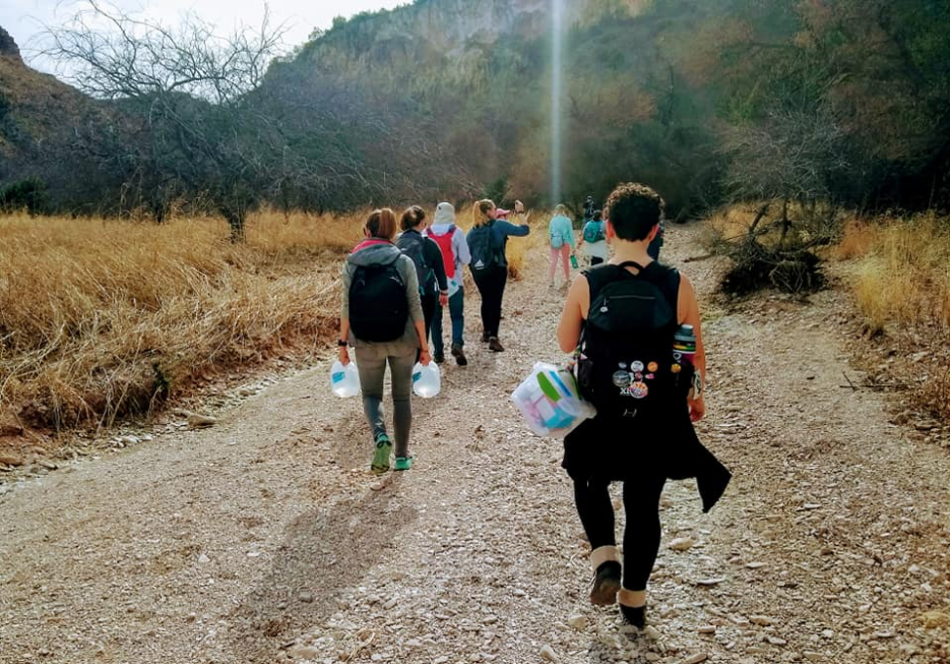The course, "US/Mexico Borderlands: Culture, Environment and Immigration," was led by Department of History and Geography faculty members Sandy Marshall and Shayna Mehas.
Seventeen students traveled to the US/Mexico border during Winter Term as part of “US/Mexico Borderlands: Culture, Environment and Immigration,” a course led by Assistant Professor of Geography Sandy Marshall and Visiting Assistant Professor of History Shayna Mehas.
Based in Tucson, Arizona, students traveled to points along the US/Mexico border including Tohono O’odham tribal territory that traditionally spanned both sides of the border as well and the border city of Nogales, Arizona/Sonora. The purpose of the course was to give students a firsthand glimpse into how communities along the border are affected by migration and border enforcement. The course also sought to provide students an opportunity to learn from different stakeholders in the immigration debate — from humanitarian organizations and the U.S. Border Patrol to migrants and families in Mexico.
Students walked away with a nuanced understanding of the human impact of immigration and border militarization. “Immigration is a hot political topic, and everyone seems to think they’re an expert on it,” said Megan Noor ’21, a political science major. “If they actually went to the border and listened to all the people impacted by our immigration policy, I think they’d realize how little any of us truly understand this complex system which has created so much suffering on both sides of the line.”

During a two-week span, students gained an appreciation for the rich cultural and ecological history of the borderlands region, visiting a Spanish mission dating back to the 1600s, historic barrios, ethnographic and ecological museums, and historical archives. To gain an insight into the contemporary immigration and border wall debate, students hiked an active migrant trail in the Sonoran Desert with volunteers from No More Deaths, a humanitarian organization that provides food, water, and medical aid to migrants.
The students also worked with Iskashitaa Refugee Network to glean more than 800 pounds of locally grown citrus fruit to donate to refugees, asylum seekers and other marginalized communities in Tucson. Students took a portion of this fruit to Casa Alitas, a migrant shelter that houses asylum seekers predominantly from Central America.
Students helped harvest food and plant seeds at Barrio Centro Mid-Town Farm, met with the local Sierra Club Borderlands chapter and learned about the history of the sanctuary movement at the Southside Presybterian Church, where the modern sanctuary movement was founded in the 1980s. In addition, students attended a Streamline trial at the federal courthouse in Tucson, Arizona where up to 75 migrants per day are sentenced to criminal charges for illegal entry into the U.S. and then deported across the border.
“We have met with so many incredible people and organizations who are doing everything they can to help some of the most vulnerable people in our country. It was so inspirational and I’m so happy to have gotten to go on this journey with my peers!
— Mackenzie Martinez ‘21
Finally, students met with workers at their home in Nogales, Sonora as well as Border Patrol officers at the agency’s flagship headquarters in Nogales, Arizona.
“Our time in Arizona has been absolutely transformational,” says Anthropology major Mackenzie Martinez ‘21. “We have met with so many incredible people and organizations who are doing everything they can to help some of the most vulnerable people in our country. It was so inspirational and I’m so happy to have gotten to go on this journey with my peers!”
While the travel portion of this Winter Term course helped to shed light on the often misunderstood borderlands region, students also sought to better understand the situation of immigrant communities in North Carolina. Before leaving for Arizona, students met with Faith Action International House, which provides assistance to newcomers to the Greensboro community. Some students will be traveling with Faith Action to visit an asylum seeker detention facility in Georgia in March.
Students will make a public presentation on what they learned on the border to the Elon community in February. For more information and updates follow this course on Twitter at @ElonBorderlands and via Instagram at @ElonBorderlands2020.



